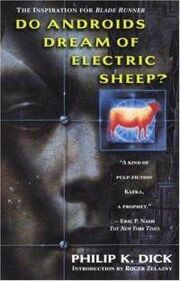Introduction[]
Do Androids Dream of Electric Sheep? - A Literary Analysis
Phillip Dick’s Do Androids Dream of Electric Sheep? is a science fiction novel describing humanity’s struggle for survival in a post-apocalyptic world after a nuclear war has irradiated the Earth, forcing humans to create a separate colony on Mars. The novel explores the importance of empathy in an increasingly technological world where humans struggle for relevance. An emerging presence of androids on Earth threatens Wilbur Mercer, causing him to create a religion known as Mercerism to give humanity a sense of unity. Mercerism’s primary principle focused on the dichotomy between humanity’s empathy and android’s apathy, only to be exposed as a fraud. Throughout the novel, Dick highlights the hypocrisy behind this artificial sense of empathy, concluding that humanity requires a unifying belief system regardless of its legitimacy.
Acceptance vs. Selectivity[]

Cover of Do Androids Dream of Electric Sheep
Dick explores one type of hypocrisy by explaining Mercerism’s attempts to unite humanity through their ability to be empathetic towards other humans. However, followers of this religion have become very selective and isolated, rendering themselves a sort of high society that does not accept all human beings. The unaccepted humans, known as chickenheads or specials, have had their intellectual capacity reduced due to radiation from the World War Terminus. Despite this fact, which is beyond their control, they are not allowed to emigrate to Mars, which is becoming the new Earth, or become integrated into human society. Through Mercerism, humans are taught to accept all those who feel empathy, yet chickenheads, who can feel empathy, are not accepted due to their mental status.
Ironically, John Isidore, who is a chickenhead, displayed the strongest instance of empathy in the entire novel. When Isadore brought a spider, which is prized for being a living animal, to the androids, they cut off four of its legs to see if would walk around with only four legs. Isadore, despite his mental deficiencies, displayed a great amount of empathy when he drowned the spider to end its suffering. Isidore’s empathy was so great that he cared more for the spider than the profit it could bring him. Isadore could have sold the creature for a large amount of money since animals have become largely extinct and in turn became a status symbol.
Truth vs. Fiction[]
Dick also explores the pretense behind the religion of Mercerism, which seeks to unite humanity through empathy and the use of mood organs to connect to the rest of humanity. The mood organs emphasize the dichotomy between the real and the unreal. Characters in the novel may use the box, which sends them into a type of virtual reality, to obtain “real” experiences and emotions. The events they experience in this virtual reality are also happening or have some kind of repercussions in the real world. However, we quickly discover that many of the images people experience in the empathy box were created by a Hollywood actor and thus the events they faced in the box were not real at all.
Furthermore, an android exposed Mercer as a fake, and Mercer later admitted that these accusations against him were indeed true. Despite the discovery of the religion’s phony origins, Mercerism lives on anyway. This fact emphasizes the struggle humans face throughout the book of what it means to be human in a artificial, digital world. To most humans, Mercer has become a messianic figure who, despite his false origins, has succeeded in uniting humanity under a spiritual umbrella in uncertain times. They would prefer to live under Mercers pretenses rather than live in a world where human emotions are becoming increasingly absent. In fact, Rick Deckard at one point explains that he feels empathy towards androids and can no longer hunt them. In return, Mercer tells him that it is indeed wrong to hunt androids, but he must do it anyway, continuing the hypocrisy of the religion.
Reality vs. Artificiality[]

Blade Runner Trailer 2007
Blade Runner was adapted from the book "Do Androids Dream of Electric Sheep?"
Dick also explores the blurred lines between living and nonliving entities. William Mercer causes most of humanity to believe that the overriding difference between humans and androids is their ability to feel empathetic towards others, and that this is ultimately what creates value in a life. However, androids somewhat deteriorate humanity’s sense of empathy and, at times, experienced empathetic emotions themselves.
For example, as Rick Deckard is hunting down his final targets, he finds androids inside an apartment building and receives fire from Roy Baty, one of the androids inside. Roy misses and runs into the other room while Deckard shoots Irmgard Baty, which causes Roy to cry out in anguish. Deckard makes the statement that Roy loved her which itself shows a form of empathy in his feelings towards someone else. Further, while androids display selfishness in their desire for self-preservation, they also display feelings for other androids when they try to preserve their livelihood as well.
Conversely, humans are taught to express no empathy for androids, which has caused them to possess fewer feelings in general, something they are fighting to preserve. Rick Deckard notices at one point that Phil Resch has been killing androids merely for killing’s sake. It has become something he enjoys and is showing no remorse for it. Rick Deckard himself displays a similar sense of selfishness by struggling throughout the novel to kill as many androids as possible to obtain a bounty. He does this so he can purchase real animals, which will increase his social status. He is not motivated by empathy for others while other human beings attempt to maintain a connection to preserve their kind, but rather to satisfy his own temporary desires for acceptance.
Conclusion[]
Ultimately, this novel explores humanity’s struggle for relevance in a dying world, in which empathy becomes the overarching uniting factor. Dick explores several secondary themes, including reality vs. artificiality, individual vs. collective desires, and truth vs. fiction, which all support the main theme by illustrating the hypocrisy behind people’s motivations to maintain unity. He concludes that people require a unifying belief system to remain relevant and maintain their humanity, regardless of its legitimacy. The characters often act in ways contradictory to the standards of the religion they follow. Mercerism helps them cope with the new disheartening reality they face. While they know it is based on false principles, they feel a sense of hope in these very principles, which have become real to them.[1]
- ↑ Do Androids Dream of Electronic Sheep? http://www.kejvmen.sk/dadoes.pdf